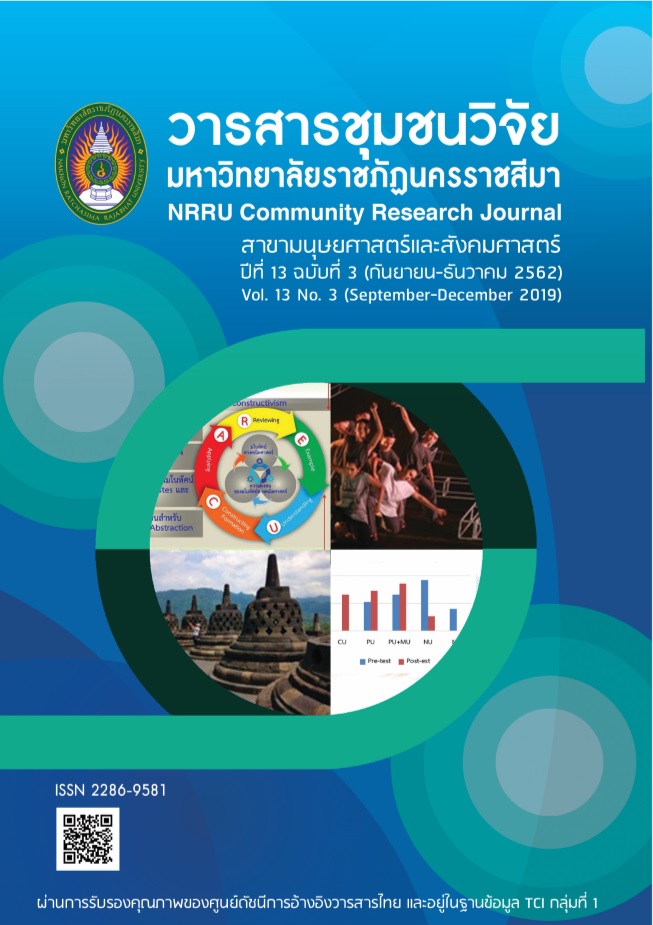A DEVELOPMENT OF MATHEMATICAL PROBLEM SOLVING AND CONNECTION ABILITIES ON THE TOPICS OF MATHEMATICAL APPLICATION OF THE 5th YEAR PRIMARY SCHOOL STUDENTS BY USING FOPS STRATEGY WITH METACOGINITIVE QUESTION
DOI:
https://doi.org/10.14456/nrru-rdi.2019.56Keywords:
FOPS strategy, Metacognitive question, ApplicationAbstract
The purpose of research were to compare mathematical problem solving and connection abilities on the application 1) between before and after using strategy to Find the problem type; Organize the information in the problem using the diagram; Plan to solve the problem; Solve the problem (FOPS) and metacognitive question 2) on 60 percent of the assigned criteria after using FOPS Strategy and metacognitive. The sample was the Prathomsuksa 5/2 of Bandankwean school, consisting of the 33 students which were selected randomly through cluster random sampling technique. The research instruments were 7 mathematics lesson plans using FOPS Strategy and metacognitive question on the application, each lesson plan in one period. Also, the experiment instruments is the mathematical problem solving, and connection abilities test, IOC values between 0.67-1.00, select the exam with difficulty from 0.31-0.44, the classification power from 0.56-0.78 and the reliability 0.87. Data was analyzed with statistics methods to find the mean, standard deviation and t-test.
The results of the study revealed that mathematical problem solving and connection abilities for students after learning organized using FOPS Strategy and metacognitive question was higher than before at the .05 level of statistical significance, and mathematical problem solving and connection abilities for students after learning organized using FOPS Strategy and metacognitive question was higher than 60 percent of the assigned criteria at the .05 level of statistical significance.
References
Buachamrat, A. (2017). Study of problem solving ability and mathematical communicaton ability on application of linear equations to one variable of Mathayom Suksa 2 students using FPS strategies. Master of Science thesis Mathematics Education College Nakhon Ratchasima Rajabhat University, Nakhon Ratchasima. (In Thai)
Erktin, E. (2015). “Enhancing Mathematics Achievement of Elementary School Students through Homework Assignments Enriched with Metacognitive Question”. Eurasia Journal of Mathematics, Science & Technology Education, 11(6), 1415-1427.
Jitendra, A. K, Kathryn, H., & Michelle, M. B. (1999). “Teaching middle school students with learning disabilities to solve word problems using a schema-based approach”. Remedial and Special Education, 20(1), 50-64.
Jitendra, A. K., & Griffin C. C. (2009). “Word problem-solving instruction in inclusive third-grade mathematics classroom.” The Journal of Education Research, 102(3), 187-201.
Jitendra, A. K., & Holf, K. (1996). The Effects of Schema-Based Instruction on the Mathematical Word-Problem-Solving Performance of Students with Learning Disabilities. Journal of Learning Disabilities, 29(4), 422-431.
Jitendra, A. K., & Star, J. R. (2011). “Meeting the needs of students with learning disabilities in inclusive mathematics classroom : The role of schema-based instruction on mathematical problem-solving.” Theory into Practice, 50, 12-19.
Kennedy, L. M., & Tipp, S. (1994). Guiding Children Learning of Mathematics 1994. Belmont, California : Wadsworth Publishing.
Maokanong, A. (2004). Conceptual understanding: the focus of mathematics teaching. In Pornphanan Udomsin and Amporn Maokanong (Editor), composing articles, principles and guidelines for learning management Group learning mathematics. Bangkok : The Agricultural Cooperative Federation of Thailand Limited. (In Thai)
_______. (2011). Mathematical skills and processes: development for development. Bangkok : Chulalongkorn University. (In Thai)
Mevarech, Z. R., & Kramarski, B. (1997). IMPROVE: A Multidimensional Method for Teaching Mathematics in Heterogeneous Classrooms. American Educational Research Journal, 34(2), 365-394.
Na, K. E. (2009). The effects of schema-based intervention on the mathematical word problem solving skills of middle school students with learning disabilities. Ed.D. Philosophy, University of Texas at Austin.
Office of the Basic Education Commission. (2010). Basic Education Core Curriculum B.E. 2551 (A.D. 2008). Bangkok : The Agricultural Cooperative Federation of Thailand Limited. (In Thai)
Rockwell, S. B. (2012). Teaching students with autism to solve additive word problem using schema-based strategy instruction. Ed.D. Philosophy, University of Florida.





